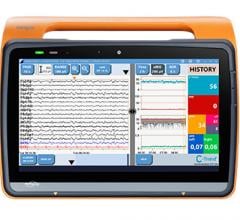October 1, 2007 – GE Global Research, the General Electric Company’s centralized research and development organization, and GE Healthcare today announced a three-year collaborative research agreement with Eli Lilly and Company to discover and develop advanced in vitro diagnostic assays that may predict cancer treatment response to targeted therapies.
The agreement between GE and Lilly will provide GE with access to clinical tissue samples from unidentified patients enrolled in Lilly’s clinical trials. In turn, Lilly will have access to GE’s advanced technologies in automated tissue-based image analysis and molecular reagents. These tools can be used during drug development to aid Lilly in evaluating the effectiveness of their drug candidates and potentially select patients for future trials.
When asked if Lilly was a rebound after the Abbott deal fell through recently, Joe Hogan, president and CEO of GE Healthcare said, “Abbott was a broad-based diagnostic acquisition, but it did not have molecular diagnostics like the Eli Lilly deal. [With Eli Lilly] we have invested in the pathology piece, which is one of the most exciting parts of the market. We are looking to add to that diagnostics platform.”
The goal of this collaboration is to discover key protein and gene signatures that will predict the likelihood that a medication will be effective in treating certain cancers. Once identified, the signatures can then be used to pre-select patients who are good candidates for the targeted therapy.
Lilly, in addition to its existing chemotherapy agents, is developing targeted cancer therapeutics, which are now in both early and late stage clinical development. GE is developing advanced multiplexed tissue-based assays and image analysis tools that can measure multiple biological pathways.
“The co-development of diagnostics and therapeutics is a major strategy of GE Healthcare’s 'Early Health' vision, and our collaboration with Lilly and our expansion into in vitro diagnostics is right in line with this strategy,” said, Michael Montalto, Ph.D., head of Molecular Imaging and Diagnostics Advanced Technologies for Global Research. “The combination of diagnostics and therapeutics is opening new doors in the fight against cancer and other life-threatening diseases. Through the application of molecular and cell biology to understanding disease, we can provide pharmaceutical companies with more advanced tools to develop more optimal drug therapies for cancer patients.”
The imaging technology GE provides will help Lilly get to trials earlier, specifically for two drugs the pharmaceutical company is working on – these include the current development of a drug for large cell lymphoma and for beta receptors.
“Our collaboration with GE complements Lilly’s research and development strategy of tailored therapeutics, or in other words, finding the right dose of the right medication at the right time for patients. Through our collaboration with GE Healthcare and GE Global Research, we hope to identify biomarkers for two of our targeted cancer therapeutic agents by examining patient tissues in order to determine which patients are most likely to respond to the medications and just as importantly which are not,” said Dr. Richard Gaynor, M.D., vice president, cancer research and global oncology platform for Eli Lilly and Company.
For more information: www.ge.com/research, www.gehealthcare.com and www.lilly.com


 October 21, 2025
October 21, 2025 









